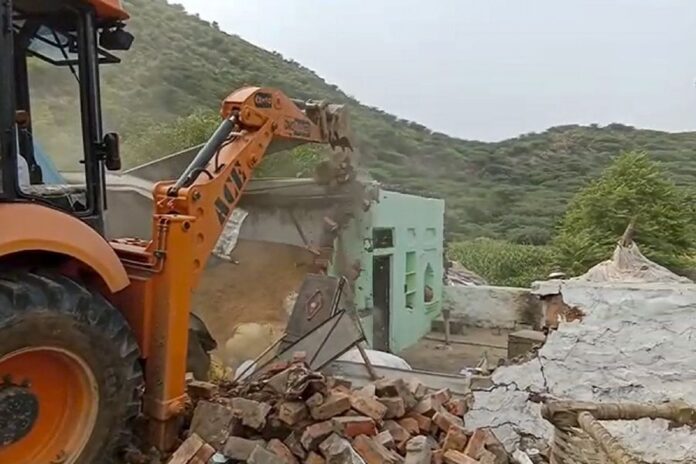India Tomorrow
NEW DELHI: On October 25, the State of Gujarat informed the Supreme Court that the lands in Gir Somnath, where recent demolitions of structures occurred, would remain under government control and not be allocated to any third parties until the next hearing. This submission was made during the Court’s consideration of a petition challenging the Gujarat High Court’s October 3 ruling, which had refused to maintain the status quo regarding the demolition of Muslim religious structures and homes in Somnath.
The Supreme Court bench, comprising Justices BR Gavai and KV Viswanathan, scheduled the next hearing for November 11. On that date, the Court will also address a contempt petition filed by the Summast Patni Muslim Jamat, which alleges that the demolitions violated the Supreme Court’s previous order.
Senior Advocate Kapil Sibal, representing the petitioner (Auliya-e-Deen Committee, Junagadh), argued that while some temples on government land were left untouched, only dargahs were targeted for demolition. He asserted that the structures were demolished under the pretext of being near the Arabian Sea, which the government cited as a reason due to their proximity to water bodies. Sibal described the demolitions as a disregard for heritage, stating that ancient dargahs and kabarstans were destroyed, constituting a contempt of the Court’s order regarding demolitions in the ‘bulldozer’ matter.
In response, Solicitor General Tushar Mehta, representing the State of Gujarat, rejected Sibal’s claims, asserting that only structures encroaching on public land were demolished and that this process began months prior. He contended that the demolished structures were not protected and accused the petitioner of withholding important information from the Supreme Court.
When Sibal requested a status quo order, the bench declined, with Justice Gavai remarking that restoration could be ordered later if necessary.
Senior Advocate Huzefa Ahmadi, representing another petitioner, argued that his client possessed a land allotment document from 1903, and that one of the demolished structures had been designated as an ancient monument and registered as a Waqf. He expressed concern over the overnight demolitions and the potential for the government to change possession of the land. Ahmadi urged the Court to maintain the current status quo until the next hearing, arguing that even if he ultimately succeeds, he would need the ability to recover the land.
Sibal supported Ahmadi’s claims, stating that although the structures are on public land, they are protected monuments and registered waqfs. He alleged that the authorities were selectively demolishing certain structures while sparing nearby temples.
The bench noted a previous order from the District Collector in 2015, which stipulated that the land in question should remain designated as government land and only used for specific purposes, such as government offices. Justice Gavai emphasized that the authorities must adhere to this order. The Solicitor General confirmed that the government would comply.
The bench then issued a directive stating that the possession of the disputed land would remain with the government and not be allotted to any third parties until further notice. In conclusion, the bench clarified that the ongoing Special Leave Petition would not prevent the High Court from addressing related matters.
In a related development, on October 4, the same bench had considered a contempt petition regarding the demolitions, noting that they occurred despite a September 17 order requiring prior Court permission for demolitions, except on public land. On that occasion, the bench chose not to issue an interim order against further demolitions, citing the Gujarat High Court’s earlier denial of similar relief.





